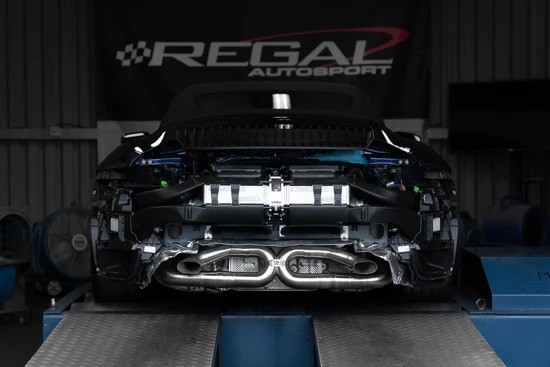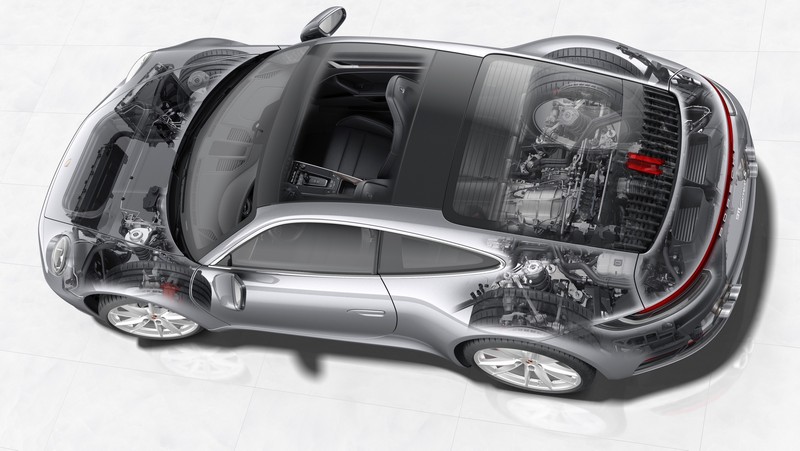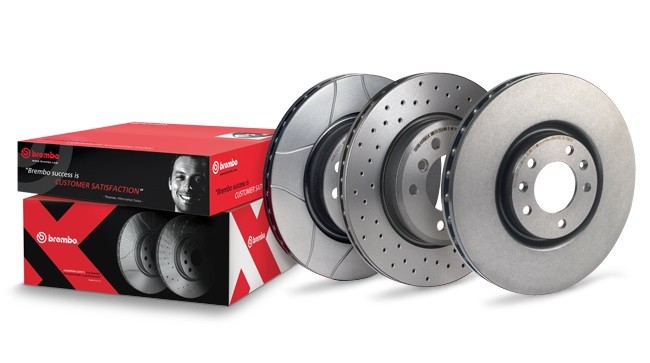The latest and greatest generation of the iconic Porsche 911 sports car hit the roads in 2019 and was dubbed the “992” chassis. Porsche is known for making incremental, evolutionary upgrades to the 911 over time, rather than radically redesigning their flagship sports car every few years like many other manufacturers. This has ensured the 911’s immediately recognizable silhouette has remained consistent over decades and doesn’t radically change the driving characteristics of such a beloved sports car from one model year to the next. The 992 generation is larger in size than its predecessor, more powerful, and quicker – by metrics, the greatest generation yet. While more technology, such as active aerodynamics, is employed and the styling (especially the rear clip) has been subtly refreshed, just like with any 911, the heart of the car remains the motor itself.
Porsche’s 3 to 4-liter flat-six motors are nearly synonymous with the 911 itself, and just like the body of the car, the flat-six has undergone evolutionary change with the newest platform. Most notably, twin turbos have made their way to the Carreras; previously, forced induction was reserved for just the very exclusive GT2 and Turbo models. The GT3 remains naturally aspirated.
Nearly all of the modifications below are relatively basic and can be conceptually applied to almost any vehicle that you wish to garner more performance from, but that doesn’t make them any less valid while planning out your 911 build. In fact, these are all modifications that a mechanically-inclined owner can do in their own garage to their own 992– with care and a little bit of planning, of course.
Intercooler Upgrades

While this used to be a topic of discussion reserved only for a few models in the Porsche lineup, now that the vast majority of 911s now sport turbochargers most owners of a 992 could benefit from an intercooler upgrade. In a nutshell, these serve as radiators for your forced induction system. Performance intercoolers are generally pricey modifications, with a good Wagner Tuning Competition Kit running over $5,000, but for a car that is going to be thrashed hard on track or on the street, you’ll find that the elimination of “heat soak” from the turbos, as well as the colder air running through the intake, will increase throttle response and drivability around town, especially at high RPMs. In order to make the most of the turbochargers that are now under the hoods of most 911s, you’ll need to spring for one of these upgraded intercoolers.
Better ECU Tune

We’ve written a lot about ECU tunes for nearly every car you could imagine, and there’s a reason for that: they are the best way to squeeze the most horsepower out of each dollar, and this is just as valid with any of the 992 911s. With a re-flashed ECU on the 3.0L motor, you can expect to see your power output increased to a whopping 627 horsepower and 533 pound-feet of torque, depending on how aggressive you go with the tune.
Be advised that some of the extreme tunes might require special high-octane fuels, so be sure to confirm with your specialist that your new tune will still run on pump gas, if that’s a concern (and it will be to most). In most cases, you’ll need to remove the ECU from the car itself and send it in to be “bench flashed,” so also anticipate a few days of downtime before you’re able to throw it back in the car and hit the road.
Brake Rotor Upgrades

Sure, the big-power modifications get all of the glory, and rightfully so. But with the crazy high power figures and lightning-quick acceleration times these cars are capable of, it’s important to make sure your brakes are up to the challenge. Ceramic brakes are all the rage and come with big bragging rights, but they must have heat in them to be most effective. Practically speaking, this only really happens on the track, and 99% of street cars won’t benefit from ceramic brakes. Instead, consider a high-quality traditional aftermarket rotor that’s been drilled and/or slotted (versus the vented rotors that are OEM equipment on the 992s). Moving to a larger diameter disc setup could be beneficial, but generally this also requires having your brake bias re-calibrated, so be sure to also budget some time at the shop if you’d like a larger brake package. There are a wide variety of brakes on the market, but Brembo offers a tremendous variety of brakes for the 992 Porsche 911s. You can choose 6-piston or 4-piston calipers, and a tremendous variety of rotors to match the calipers: Type 3, drilled, or slotted. That iconic Brembo logo peeking out from behind your wheel also looks great and lets everyone know that your car gets driven hard.
Conclusion
For many of those who will buy a new Porsche 911, they’ll find that the vehicle leaves nothing to be desired at all. It’s balanced, fast, and handles great right out of the factory, and it far more capable than your average driver. That said, Porsches have a reputation for being the hot rods of the sports car world, in that there is a passionate community of drivers who love to personalize and hop up their Porsches no matter how great the factory builds them. While cars get harder to work on as time progresses, Porsche retains a strong “do it yourself” community that enjoys wrenching and working on their own cars far more than their competition – even with the “base” Carreras now starting at right around $100k.
While the 992 platform is still in its nacency and the aftermarket is still growing, any of the above upgrades will give your 911 that extra bit of subtle pizzazz and the performance to make your ride the talk of the next Cars & Coffee you go to.


